Overview
Adding a Site to an account is a task that can only be performed by the Account Administrator in the Admin Dashboard.
Step-by-step
1. To add a new Site to the account, go to the Control Panel and click ![]() to access the "Site Management" page.
to access the "Site Management" page.

The "Site Management" page displays the sites contained in an account.
2. Click ![]() .
.
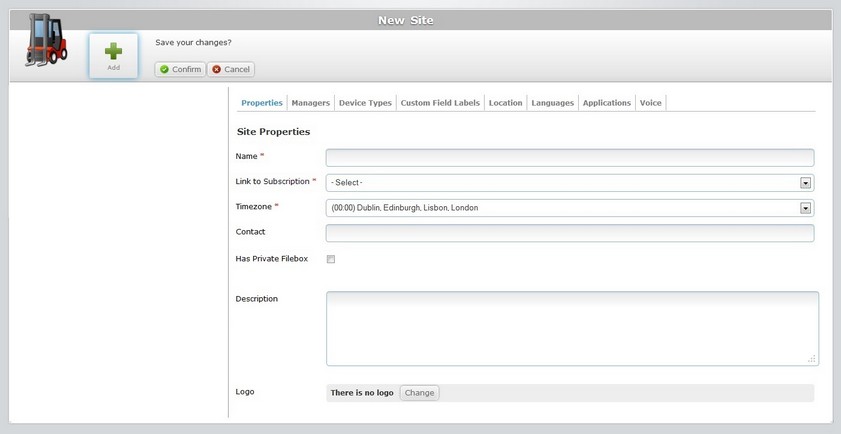
The resulting "New Site" page opens in "edit mode" and includes eight tabs that need to be filled in ("Properties"; "Managers"; "Device Types"; "Custom Field Labels"; "Location"; "Languages"; "Applications"; "Voice". This last tab is only available if the subscription includes Voice applications). The "Properties" tab is open, by default.
3. Fill in the mandatory fields (marked with an asterisk) and, if required, the remaining fields.
Name * |
Fill in the name of the new site. |
Link to Subscription * |
Select an available subscription from the drop-down list. |
Timezone * |
Select the site's timezone from the drop-down list. |
Contact |
Enter a contact number for the site. |
Has Private Filebox |
Check this option if you want the site to have a private filebox. See Filebox. |
Description |
Add any notes you may find useful. |
Logo |
Add a logo to a site: 1. Click 2. In the resulting OS file explorer window, select the appropriate image file. 3. Click
The logo is displayed in the corresponding site's Site Dashboard. To edit the logo, see Add a logo to a site. |
4. Advance to the "Managers" tab.
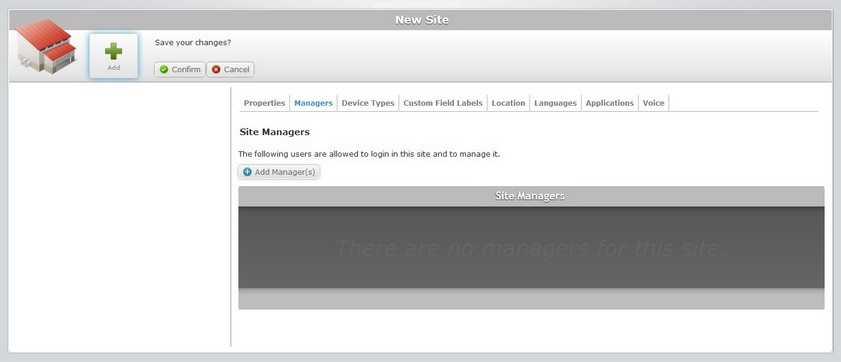
5. Add a site manager to the site. Use ![]() . See Adding a Site Manager to a Site.
. See Adding a Site Manager to a Site.
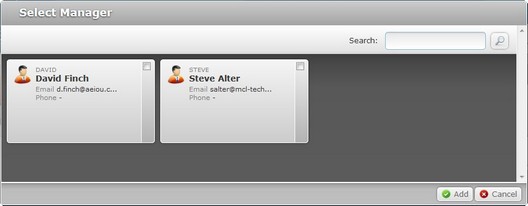
![]() The adding of a Site Manager to a site always implies the previous creation of "Site Manager" profiles. See Adding a User.
The adding of a Site Manager to a site always implies the previous creation of "Site Manager" profiles. See Adding a User.
6. In the "Select Manager" window, select the desired site manager(s) by clicking the corresponding ![]() .
.
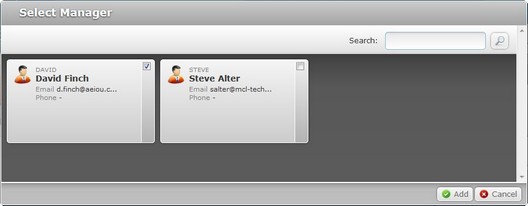
If required, use ![]() to filter the displayed information:
to filter the displayed information:
a. Enter what you want to search for.
b. Click ![]() or press <ENTER> in your PC keyboard to initiate the search.
or press <ENTER> in your PC keyboard to initiate the search.
c. To conclude the search operation, empty the search box and click ![]() or press <ENTER> in your PC keyboard.
or press <ENTER> in your PC keyboard.
7. Click ![]() to apply your choice(s).
to apply your choice(s).
8. Go to the "Device Types" tab.
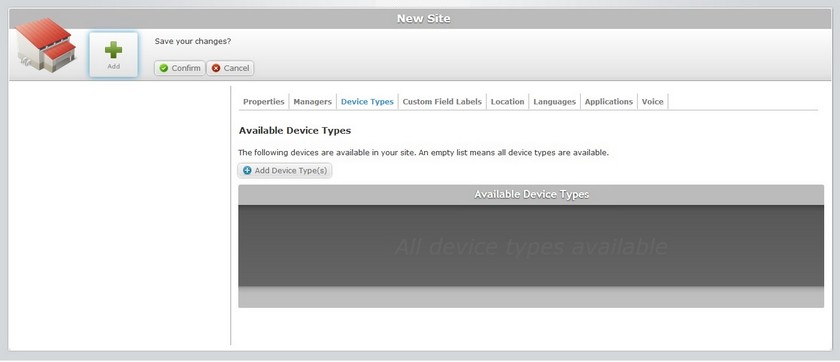
9. Click ![]() to open a window with a list of available devices.
to open a window with a list of available devices.
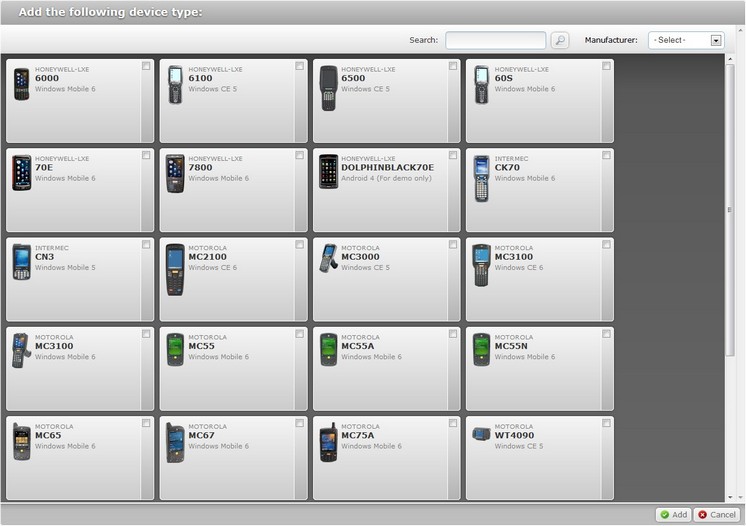
If required, use the ![]() or the drop-down list with the available manufacturers to filter the displayed information.
or the drop-down list with the available manufacturers to filter the displayed information.
10. Select the required device model(s) by checking the corresponding ![]() . If no device types are specified, all are available.
. If no device types are specified, all are available.
11. Click ![]() to apply your choices.
to apply your choices.
12. Move on to the "Custom field labels" tab.
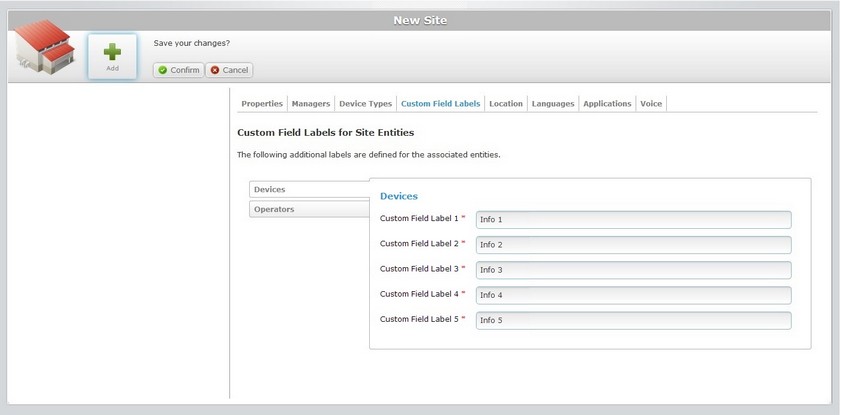
13. If required, replace the labels of the fields displayed in the "Device" and/or "Operator" details page. These fields are mandatory, meaning, they have to be filled with either the default options or with your suggestions.
![]() This label customization is only necessary if you require more specific details about a device or operator.
This label customization is only necessary if you require more specific details about a device or operator.
Replace the default labels ("Info 1; 2; 3; 4; 5") for labels that represent the information you want to retrieve.
Ex: If you want to use one of the fields to view when a device was acquired, replace "Info 1" for "Acquisition Date". All devices now have a field, in the "Device Details" page, to fill in with the required information, meaning, the date the terminal was acquired.
14. Go to the "Location" tab.
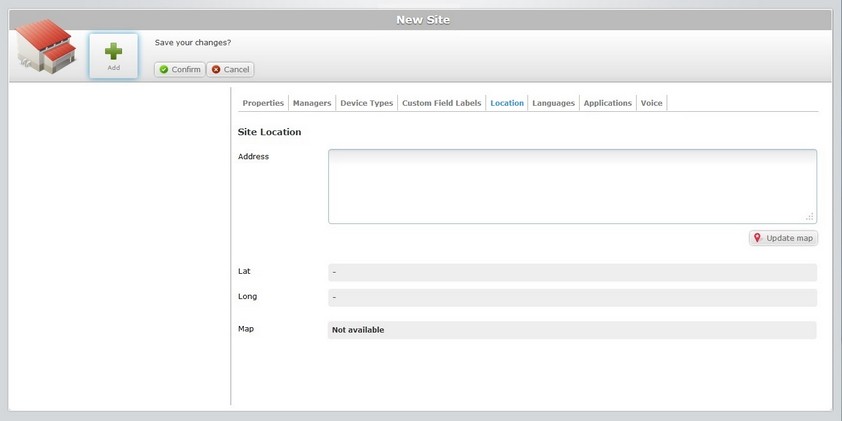
15. Enter the site's address in the "Address" box.
16. Click ![]() to view the site's location on the map.
to view the site's location on the map.
The latitude and longitude coordinates are automatically filled in as soon as you click ![]() but, at this point, continue to the next tab.
but, at this point, continue to the next tab.
17. Continue to the "Languages" tab.
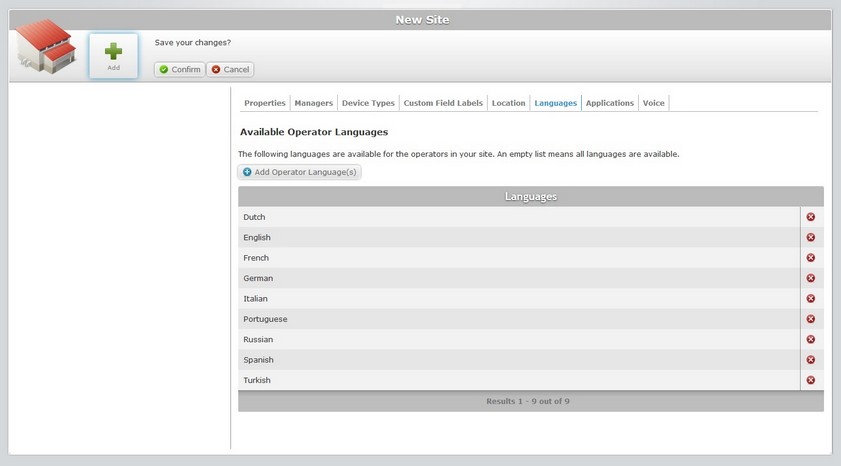
18. Click ![]() to open a window with the available languages.
to open a window with the available languages.
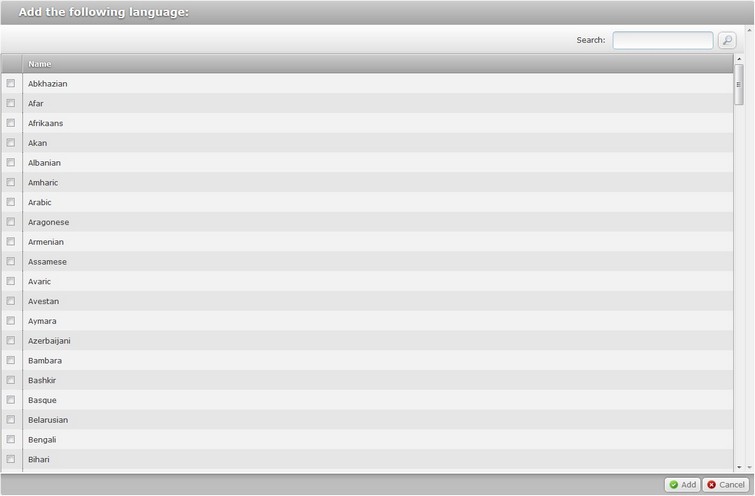
19. Select the required language(s) by checking the corresponding ![]() . If no languages are specified, all are available.
. If no languages are specified, all are available.
20. Click ![]() to apply your choices.
to apply your choices.
If required, use the ![]() to search for a specific language.
to search for a specific language.
a. Enter what you want to search for.
b. Click ![]() or press <ENTER> in your PC keyboard to initiate the search.
or press <ENTER> in your PC keyboard to initiate the search.
c. To conclude the search operation, empty the search box and click ![]() or press <ENTER> in your PC keyboard.
or press <ENTER> in your PC keyboard.
21. Go to the "Applications" tab.
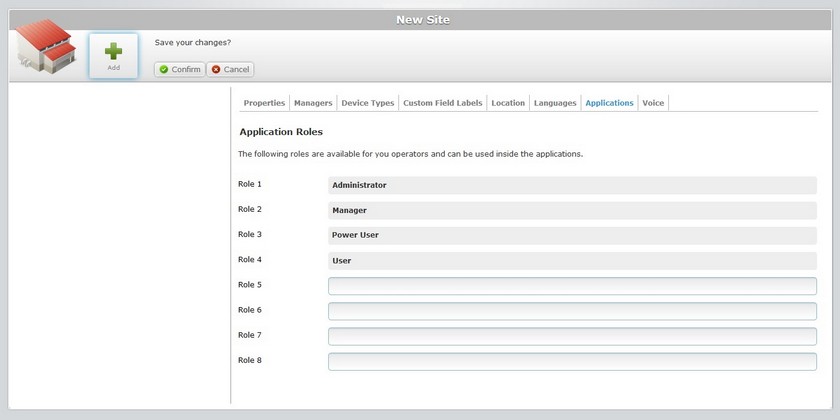
22. This tab provides you with the possibility to add roles to an operator. There are four default roles available, but you can add more, according to the internal organization of your company. All of these options are displayed in the "Role" drop-down list option of the "Operator Details". See Operator Details.
23. Proceed to the "Voice" tab.
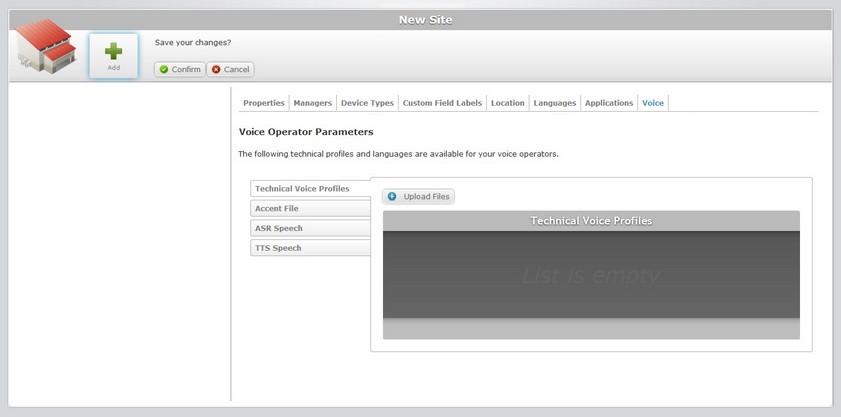
This tab allows you to add technical profiles and language files. You must click on each side tab to add the corresponding file.
The "Technical Voice Profiles" side tab is open, by default.
24. Click ![]() .
.
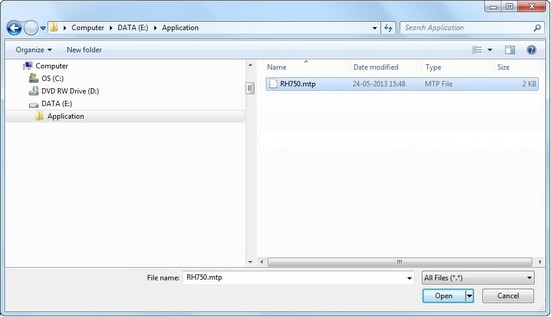
The first time you click ![]() , your OS file explorer window opens automatically, to allow you to select a file. Continue to step 25.
, your OS file explorer window opens automatically, to allow you to select a file. Continue to step 25.
When you repeat the process, you open an "Upload File" window. In this case, proceed as described in steps 27 and 28).
25. Select the appropriate file (with an .mtp extension for technical voice profile or an .lmd extension for accent file) and click ![]() .
.
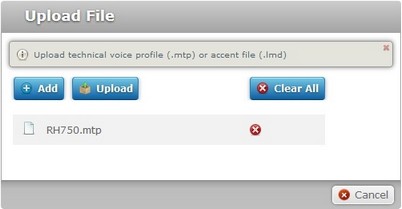
The file is displayed in the "Upload File" window.
26. If you are done adding files, proceed to step 29. If you want to add more files, continue to step 27.
27. Click ![]() .
.
28. Select the required file in the OS file explorer window and click ![]() .
.
You can, at any moment, delete added files. To delete one file, click the corresponding ![]() . To delete all added files, click
. To delete all added files, click ![]() .
.
29. Once you have added the required file(s), click ![]() .
.
The files upload automatically and are displayed in the selected side tab.

![]() If required, use the following buttons (only available in "edit mode"):
If required, use the following buttons (only available in "edit mode"):
![]() to delete the corresponding file.
to delete the corresponding file.
![]() to download the corresponding file.
to download the corresponding file.
30. If required, proceed the same way for each tab (repeat steps 24 through 29).
31. Save your changes (in all tabs) by clicking ![]() .
.
The page is set to "view mode" and the new site is, now, displayed in the Admin Dashboard's "Site Shortcuts" section.